In the fast-paced world of business, staying ahead of the competition requires the right tools and strategies. Field service dispatch software has become a game-changer, revolutionizing how businesses manage their operations and provide services to customers.
Field service managers play a crucial role in leveraging this software to streamline their operations, track job assignments, monitor technician status, and optimize routes for maximum efficiency. By implementing the top field service dispatch software solutions in 2024, businesses can enhance productivity, improve customer satisfaction, and ultimately drive growth.
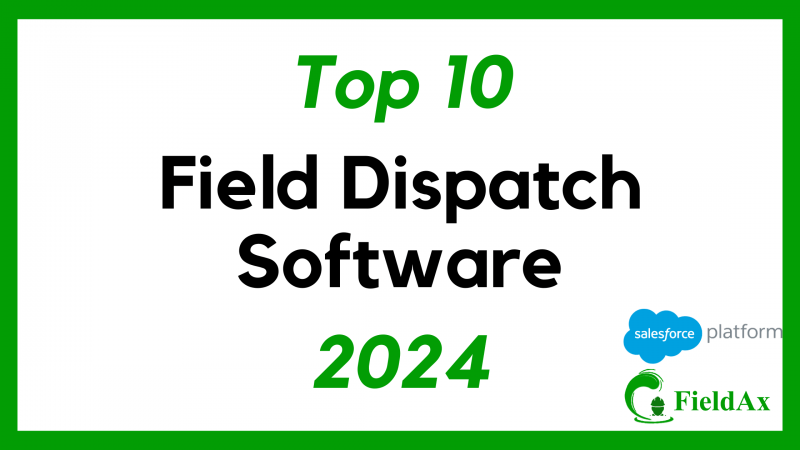
Features and Functionality of Field Service Dispatch Software
When it comes to field service dispatch software, top solutions offer a comprehensive set of features and functionality to streamline operations and improve efficiency. Here are some of the key features you can expect from the best field service dispatch software solutions:
1. Automated Scheduling
Efficient scheduling is essential for field service operations, and top software solutions offer automated scheduling capabilities. This feature helps to minimize scheduling conflicts, optimize technician routes, and ensure timely service delivery.
2. Real-Time Visibility
Real-time visibility into field operations is crucial for effective decision-making. Field service dispatch software provides real-time updates on technician locations, job status, and customer information, enabling managers to make informed decisions on the fly.
3. Communication Tools
Effective communication is key in field service management, and top software solutions offer robust communication tools. These tools include messaging and notification features to keep technicians and customers informed throughout the service process.
4. Job Assignment and Tracking
Field service dispatch software allows for easy job assignment and tracking, ensuring that the right technician is assigned to the right job at the right time. Managers can track job progress, monitor technician performance, and access job histories for better insight into operations.
5. Inventory Management
Inventory management is a critical aspect of field service operations, and top software solutions include inventory tracking and management capabilities. This feature helps to ensure that technicians have the right parts and tools on hand to complete jobs efficiently.
6. Reporting and Analytics
Reporting and analytics tools are essential for monitoring KPIs and performance metrics in field service operations. Field service dispatch software provides customizable reporting features, allowing managers to track key metrics, analyze trends, and make data-driven decisions.
With these advanced features and functionality, top field service dispatch software solutions are designed to address the common challenges faced by field service managers and optimize field operations for maximum efficiency and customer satisfaction.
Benefits of Using Field Service Dispatch Software
Implementing field service dispatch software can bring a plethora of benefits to businesses looking to streamline their operations and improve efficiency. Here are some key advantages that businesses can expect:
- Improved Scheduling Accuracy: Field service dispatch software helps businesses accurately schedule appointments and assign tasks to field technicians, reducing the risk of double bookings and missed appointments.
- Enhanced Customer Satisfaction: By optimizing scheduling and dispatch processes, businesses can provide better service to their customers, leading to higher satisfaction levels and increased loyalty.
- Increased Employee Productivity: With the help of field service dispatch software, businesses can improve communication with field technicians, track their progress in real time, and allocate resources more effectively, resulting in higher productivity levels.
These benefits not only improve the day-to-day operations of a business but also contribute to overall growth and success. By leveraging field service dispatch software, businesses can enhance their efficiency, deliver superior service to customers, and ultimately drive profitability.
List of the Best Field Service Dispatch Software Solutions in 2024.
To assist you in finding the best software that meets your requirements, the Merfantz team has meticulously compiled a list of top Dispatch Software Solutions, ranked according to their feature sets, ease of use, value for money, and integrations. Hopefully, you can find a solution that helps streamline your field service processes and reduce costs. The software is listed here based on the IBISWorld research report, with no particular order specified.
Solution 1: Salesforce Field Service Lightning

Salesforce Field Service Lightning is a robust platform designed to streamline field service operations, empower technicians, and enhance customer experiences. Here’s an overview of its key features and pricing:
Key Features
- Work Order Management: Field Service Lightning enables efficient work order creation, scheduling, and dispatching. It provides real-time visibility into technician availability, skills, and location to optimize job assignments.
- Mobile Workforce Enablement: Technicians can access job details, customer information, and knowledge resources on-the-go through mobile devices. This ensures they have all necessary information at their fingertips to complete tasks efficiently.
- Dynamic Scheduling: The platform uses AI-driven scheduling algorithms to optimize technician routes, considering factors such as travel time, skill requirements, and SLA commitments. This helps minimize travel costs and maximize technician productivity.
- Asset Management: Field Service Lightning allows organizations to track and manage customer assets, equipment, and inventory. Technicians can easily access asset histories, maintenance schedules, and warranty information to provide proactive service.
- Customer Communication: The platform facilitates seamless communication between customers and field service teams. It offers features like automated appointment reminders, service status updates, and feedback collection to enhance customer satisfaction.
- Integration Capabilities: Field Service Lightning integrates seamlessly with other Salesforce products, as well as third-party systems such as ERP and IoT platforms. This enables organizations to leverage existing data and processes, improving operational efficiency and collaboration.
Pricing :
Salesforce Field Service Lightning pricing typically follows a subscription-based model, with pricing tiers based on the number of users and desired features. Since Salesforce often tailors pricing based on individual business needs and requirements, it’s recommended to contact Salesforce sales representatives or visit their website for the most up-to-date pricing information and to request a quote tailored to specific organizational needs.
Solution 2: FieldAx

FieldAx is a field service management solution aimed at streamlining operations, enhancing productivity, and improving customer satisfaction. Here’s an overview of its key features and pricing:
Key Features
- Work Order Management: FieldAx provides tools for creating, assigning, and tracking work orders in real-time. It offers features such as drag-and-drop scheduling, customizable workflows, and job status updates to ensure smooth job execution.
- Mobile Access: Technicians can access FieldAx through mobile devices, allowing them to view their schedules, update job statuses, capture photos, and access customer information while in the field. This mobile accessibility improves efficiency and enables better communication with the back office.
- Dispatching and Routing: The platform offers dispatching and routing capabilities to optimize technician assignments based on factors like location, skills, and workload. This helps minimize travel time and ensures timely service delivery.
- Asset Management: FieldAx enables organizations to manage customer assets, equipment, and inventory effectively. Technicians can view asset details, maintenance history, and service requirements, allowing for proactive maintenance and asset tracking.
- Customer Communication: FieldAx facilitates communication with customers through features like automated notifications, service appointment reminders, and feedback collection. This helps improve transparency and keeps customers informed throughout the service process.
- Reporting and Analytics: The platform provides reporting and analytics tools to track key performance metrics, analyze trends, and identify areas for improvement. Customizable reports and dashboards offer insights into technician performance, job completion rates, and customer satisfaction.
Pricing
FieldAx offers a straightforward pricing model with a fixed rate of $35 USD per user. This pricing structure provides transparency and simplicity for organizations, allowing them to easily calculate costs based on the number of users accessing the platform. However, it’s important for businesses to consider any additional fees or customization options that may impact the total cost of ownership. Overall, the $35 USD per user pricing for FieldAx presents a competitive and affordable option for organizations seeking a field service management solution.
Solution 3: Oracle Field Service Automation
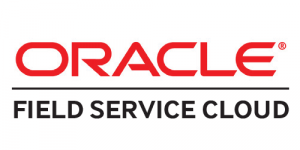
Oracle Field Service Cloud-Based Field Service Automation is a comprehensive solution designed to optimize field service operations, improve technician efficiency, and enhance customer satisfaction. Here’s an overview of its key features and pricing:
Key Features
- Work Order Management: Oracle Field Service Cloud enables efficient creation, scheduling, and dispatching of work orders. It offers advanced capabilities such as dynamic scheduling, automated routing, and predictive maintenance to ensure timely and effective service delivery.
- Mobile Workforce Empowerment: Technicians can access Oracle Field Service Cloud via mobile devices, allowing them to view job details, update statuses, capture photos, and access customer information while on-site. This mobile accessibility enhances productivity and enables real-time communication between field technicians and dispatchers.
- Intelligent Scheduling: The platform leverages AI-driven scheduling algorithms to optimize technician assignments based on factors such as location, skills, availability, and customer preferences. This helps minimize travel time, improve resource utilization, and meet service level agreements (SLAs) more efficiently.
- Asset and Inventory Management: Oracle Field Service Cloud provides tools for managing customer assets, equipment, and inventory. Technicians can access asset histories, maintenance records, and parts availability to ensure they have the necessary resources to complete jobs effectively.
- Customer Engagement: The platform facilitates proactive customer engagement through features like automated notifications, appointment reminders, and self-service portals. This helps improve communication, transparency, and overall customer satisfaction.
- Analytics and Reporting: Oracle Field Service Cloud offers robust analytics and reporting capabilities to track key performance metrics, analyze trends, and identify areas for improvement. Customizable dashboards and reports provide valuable insights into technician performance, job completion rates, and customer feedback.
Pricing
Oracle Field Service starts at $100 per user, per month for the Professional version. Oracle also offers a pricing option for contingent workers, at $5 per activity, as an add-on to Oracle Field Service Professional or Enterprise editions. It’s advisable to contact Oracle sales representatives or visit their website for detailed pricing information and to request a tailored quote.
Solution 4: SAP Field Service Management

SAP Field Service Management is a robust solution designed to optimize field service operations, enhance technician productivity, and improve customer experiences. Here’s an overview of its key features and available pricing information:
Key Features
- Work Order Management: SAP Field Service Management offers comprehensive tools for creating, scheduling, and managing work orders. It includes features such as automated dispatching, drag-and-drop scheduling, and real-time job status updates to streamline operations and improve efficiency.
- Mobile Workforce Enablement: Technicians can access SAP Field Service Management via mobile devices, allowing them to view job details, update statuses, access knowledge resources, and communicate with dispatchers and customers while in the field. This mobile accessibility improves agility and enhances communication.
- Dynamic Scheduling: The platform utilizes advanced scheduling algorithms to optimize technician assignments based on factors like location, skills, availability, and customer priorities. This helps minimize travel time, maximize resource utilization, and meet service level agreements (SLAs) more effectively.
- Asset and Inventory Management: SAP Field Service Management provides capabilities for managing customer assets, equipment, and spare parts inventory. Technicians can access asset histories, maintenance records, and parts availability to ensure they have the necessary resources to complete jobs efficiently.
- Customer Engagement: The platform enables proactive customer engagement through features such as automated notifications, appointment reminders, and self-service portals. This helps improve communication, transparency, and overall customer satisfaction.
- Analytics and Reporting: SAP Field Service Management offers robust analytics and reporting tools to track key performance metrics, analyze trends, and identify areas for improvement. Customizable dashboards and reports provide valuable insights into technician performance, job completion rates, and customer feedback.
Pricing
SAP Start at $940. But, typically offers customized pricing for its Field Service Management solutions based on factors such as the number of users, required features, deployment options, and additional services or integrations. While specific pricing information may not be readily available online, businesses can contact SAP sales representatives or visit their website for detailed pricing information and to request a tailored quote. It’s advisable to inquire directly with SAP to confirm pricing details and explore options that best suit individual business needs and budget considerations.
Solution 5: ServiceM8
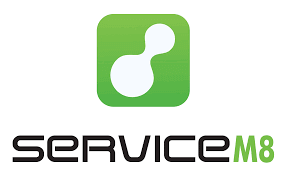
ServiceM8 is a cloud-based field service management platform designed to simplify and streamline operations for small to medium-sized businesses. Here’s an overview of its key features and pricing:
Key Features
- Job Management: ServiceM8 allows businesses to create, schedule, and manage jobs efficiently. It offers features such as drag-and-drop scheduling, job templates, and customizable workflows to streamline job allocation and execution.
- Mobile Accessibility: Technicians can access ServiceM8 via mobile devices, enabling them to view job details, update job statuses, capture photos, and communicate with customers and the office in real-time. This mobile accessibility improves efficiency and enhances communication between field staff and the back office.
- Online Booking and Quoting: ServiceM8 provides tools for online booking and quoting, allowing customers to request services and receive quotes directly through the platform. Businesses can customize booking forms and automate quote generation to streamline the customer acquisition process.
- Invoicing and Payments: The platform offers invoicing and payment processing capabilities, allowing businesses to generate invoices, track payments, and accept payments online. Integration with accounting software further simplifies financial management tasks.
- Reporting and Analytics: ServiceM8 includes reporting and analytics tools to track key performance metrics, analyze job profitability, and identify opportunities for improvement. Customizable reports and dashboards provide insights into business performance and help inform strategic decision-making.
- Integration Capabilities: ServiceM8 integrates with a variety of third-party tools and services, including accounting software, payment gateways, and customer relationship management (CRM) systems. This allows businesses to streamline workflows, improve data accuracy, and enhance productivity.
Pricing
ServiceM8 offers tiered pricing plans based on the number of users and desired features. The pricing plans typically range from basic to advanced tiers, with monthly subscription fees starting at around $29 USD per user for the basic plan and Premium Plus is $349/mo. Advanced plans may include additional features such as online booking, reporting, and integration capabilities, with pricing increasing accordingly. Businesses can visit the ServiceM8 website for detailed pricing information and to sign up for a free trial or request a customized quote based on their specific needs.
Solution 6: Jobber
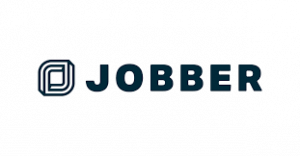
Jobber is a comprehensive field service management software designed to help small and medium-sized service businesses streamline operations, manage workflows, and improve customer experiences.
Key Features
- Job Scheduling and Dispatching: Jobber allows businesses to schedule and dispatch jobs efficiently. It offers drag-and-drop scheduling, calendar views, and real-time updates to streamline job allocation and optimize technician routes.
- Client Management: The platform provides tools for managing client information, including contact details, service history, and communication logs. Businesses can track client interactions, send personalized communications, and maintain a centralized database of client data.
- Quoting and Invoicing: Jobber offers quoting and invoicing capabilities to streamline the billing process. Businesses can create professional quotes, send invoices, and accept online payments through integrated payment processing solutions.
- Mobile Accessibility: Technicians can access Jobber through the mobile app, allowing them to view job details, update job statuses, capture photos, and communicate with clients while on-site. This mobile accessibility improves efficiency and enables real-time communication between field staff and the office.
- Reporting and Analytics: Jobber includes reporting and analytics tools to track key performance metrics, analyze job profitability, and identify trends. Customizable reports and dashboards provide insights into business performance and help inform strategic decision-making.
- Integration Capabilities: Jobber integrates with a variety of third-party tools and services, including accounting software, payment processors, and marketing platforms. This allows businesses to streamline workflows, improve data accuracy, and enhance productivity.
Pricing
Jobber offers tiered pricing plans based on the number of users and the features included. The pricing plans typically range from basic to advanced tiers, with monthly subscription fees starting at around $35USD per month for the basic plan. Advanced plans is $175/mo and it may include additional features such as client reminders, online booking, and advanced reporting, with pricing increasing accordingly. Businesses can visit the Jobber website for detailed pricing information and to sign up for a free trial or request a customized quote based on their specific needs.
Solution 7: ServiceMax
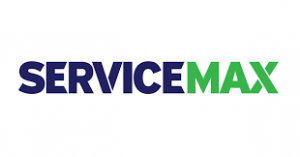
ServiceMax is a comprehensive field service management solution tailored for enterprises in various industries such as manufacturing, energy, healthcare, and telecommunications. Here’s an overview of its key features and available pricing information:
Key Features:
- Work Order Management: ServiceMax allows organizations to efficiently create, assign, and manage work orders. It offers features like automated scheduling, dispatching, and real-time job status updates to streamline operations and improve productivity.
- Asset and Inventory Management: The platform provides tools for tracking and managing customer assets, equipment, and spare parts inventory. Technicians can access asset details, maintenance history, and parts availability to ensure they have the necessary resources to complete jobs effectively.
- Mobile Field Service: ServiceMax offers a mobile app for field technicians, enabling them to access job details, update work orders, capture photos, and communicate with the back office and customers in real-time. This mobile accessibility enhances technician productivity and improves customer service.
- Preventive Maintenance: ServiceMax includes features for implementing preventive maintenance programs to minimize equipment downtime and extend asset lifespan. Organizations can schedule routine maintenance tasks, track service history, and proactively identify potential issues before they escalate.
- Customer Engagement: The platform facilitates proactive customer engagement through features like automated notifications, service appointment reminders, and self-service portals. This helps improve communication, transparency, and overall customer satisfaction.
- Analytics and Reporting: ServiceMax offers robust analytics and reporting tools to track key performance metrics, analyze trends, and identify areas for improvement. Customizable dashboards and reports provide valuable insights into technician performance, job completion rates, and service profitability.
Pricing:
ServiceMax typically offers customized pricing based on factors such as the number of users, required features, and deployment options. While specific pricing information may not be readily available online, businesses can contact ServiceMax sales representatives or visit their website for detailed pricing information and to request a tailored quote. It’s advisable to inquire directly with ServiceMax to confirm pricing details and explore options that best suit individual business needs and budget considerations.
Solution 8: Housecall

Housecall Pro is a comprehensive field service management software designed primarily for small to medium-sized home service businesses such as plumbing, HVAC, electrical, and landscaping companies. Here’s an overview of its key features and pricing:
Key Features:
- Job Scheduling and Dispatching: Housecall Pro allows businesses to schedule and dispatch jobs efficiently. It offers drag-and-drop scheduling, calendar views, and real-time updates to streamline job allocation and optimize technician routes.
- Client Management: The platform provides tools for managing client information, including contact details, service history, and communication logs. Businesses can track client interactions, send personalized communications, and maintain a centralized database of client data.
- Quoting and Invoicing: Housecall Pro offers quoting and invoicing capabilities to streamline the billing process. Businesses can create professional quotes, send invoices, and accept online payments through integrated payment processing solutions.
- Mobile Accessibility: Technicians can access Housecall Pro through the mobile app, allowing them to view job details, update job statuses, capture photos, and communicate with clients while on-site. This mobile accessibility improves efficiency and enables real-time communication between field staff and the office.
- Online Booking: Housecall Pro offers online booking capabilities, allowing customers to request services and book appointments directly through the platform. This feature simplifies the booking process and enhances customer convenience.
- Reporting and Analytics: Housecall Pro includes reporting and analytics tools to track key performance metrics, analyze job profitability, and identify trends. Customizable reports and dashboards provide insights into business performance and help inform strategic decision-making.
Pricing:
Housecall Pro offers tiered pricing plans based on the number of users and the features included. The pricing plans typically range from basic to advanced tiers, with monthly subscription fees starting at around $49 USD per month for the basic plan. Advanced plans may include additional features such as automated marketing, advanced reporting, and customer follow-up tools, with pricing increasing accordingly. Businesses can visit the Housecall Pro website for detailed pricing information and to sign up for a free trial or request a customized quote based on their specific needs.
Solution 9: ServiceTitan
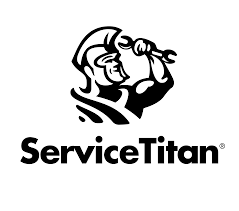
ServiceTitan is a robust field service management software tailored for home service businesses, particularly in industries such as HVAC, plumbing, electrical, and landscaping. Here’s an overview of its key features and available pricing information:
Key Features:
- Job Scheduling and Dispatching: ServiceTitan offers powerful scheduling and dispatching tools to streamline job allocation and optimize technician routes. It includes features like drag-and-drop scheduling, automated dispatching, and real-time job status updates to improve efficiency.
- Customer Management: The platform provides tools for managing customer information, including contact details, service history, and communication logs. ServiceTitan allows businesses to track customer interactions, send personalized communications, and maintain a centralized database of client data.
- Quoting and Invoicing: ServiceTitan offers quoting and invoicing capabilities to streamline the billing process. Businesses can create professional quotes, send invoices, and accept payments through integrated payment processing solutions.
- Mobile Accessibility: Technicians can access ServiceTitan through the mobile app, allowing them to view job details, update job statuses, capture photos, and communicate with customers while in the field. This mobile accessibility enhances productivity and improves communication between field staff and the office.
- Inventory Management: ServiceTitan includes inventory management features to track and manage parts, supplies, and equipment. Technicians can access inventory levels, create purchase orders, and track usage to ensure they have the necessary resources to complete jobs efficiently.
- Reporting and Analytics: ServiceTitan offers robust reporting and analytics tools to track key performance metrics, analyze job profitability, and identify trends. Customizable reports and dashboards provide insights into business performance and help inform strategic decision-making.
Pricing:
ServiceTitan Starts from $125 to $398. But, typically offers customized pricing based on factors such as the number of users, required features, and business size. While specific pricing information may not be readily available online, businesses can contact ServiceTitan sales representatives or visit their website for detailed pricing information and to request a tailored quote. It’s advisable to inquire directly with ServiceTitan to confirm pricing details and explore options that best suit individual business needs and budget considerations.
Solution 10: Odoo

Odoo Field Service is a module within the Odoo ERP system designed to manage field service operations efficiently. As part of Odoo’s open-source platform, it offers several features to streamline field service management. Here’s an overview of its key features and some insights into its pricing model:
Key Features:
- Work Order Management: Odoo Field Service allows businesses to create, assign, and manage work orders seamlessly. It includes features such as job scheduling, dispatching, and real-time updates to optimize technician assignments and improve productivity.
- Customer Management: The platform provides tools for managing customer information, including contact details, service history, and communication logs. Businesses can track customer interactions, send notifications, and maintain a centralized database of client data.
- Mobile Accessibility: Technicians can access Odoo Field Service through the mobile app, enabling them to view job details, update job statuses, capture photos, and communicate with customers while in the field. This mobile accessibility enhances technician productivity and improves communication between field staff and the office.
- Inventory Management: Odoo Field Service includes inventory management features to track and manage parts, supplies, and equipment. Technicians can access inventory levels, create purchase orders, and track usage to ensure they have the necessary resources to complete jobs efficiently.
- Reporting and Analytics: Odoo Field Service offers reporting and analytics tools to track key performance metrics, analyze job profitability, and identify trends. Customizable reports and dashboards provide insights into business performance and help inform strategic decision-making.
Pricing:
Odoo Field Service is part of the Odoo ERP system, which follows a modular pricing model. Odoo offers a community edition (open-source) and a subscription-based enterprise edition. The community edition is free and includes basic features, while the enterprise edition offers advanced functionality and support services at a subscription fee. However, additional costs may be incurred for customization, implementation, and hosting services, depending on business requirements. Organizations can explore the Odoo website for more details on pricing and available features, and they can also consult with Odoo representatives for personalized pricing information tailored to their specific needs.
User Reviews and Ratings of Field Service Dispatch Software
As businesses continue to rely on field service dispatch software to streamline their operations, user reviews and ratings play a crucial role in helping others make informed decisions. By sharing their experiences with these software solutions, users can provide valuable insights into the effectiveness and usability of the platforms.
Positive reviews and high ratings can give businesses the confidence to invest in a particular field service dispatch software, knowing that it has been well-received by others in similar industries. On the other hand, negative reviews and low ratings can steer businesses away from platforms that may not meet their needs or expectations.
Industry Trends in Field Service Management
As technology continues to evolve, the field service management industry is constantly changing. It’s important for businesses to stay up-to-date with the latest trends to remain competitive in the market.
Explore the latest industry trends in field service management and how they are shaping the development of field service dispatch software.
- Internet of Things (IoT) Integration: With the rise of IoT devices, field service management software is incorporating IoT integration to streamline operations and improve efficiency.
- Mobile Field Service: Mobile technology is increasingly being leveraged in field service management, allowing technicians to access real-time information and updates on the go.
- Predictive Maintenance: Predictive maintenance technology is on the rise, helping businesses anticipate and prevent equipment failures before they occur.
- Artificial Intelligence (AI) and Machine Learning: AI-powered tools are being used in field service management to automate processes, optimize scheduling, and improve service delivery.
- Data Analytics: Data analytics tools are transforming field service management by providing valuable insights and optimizing performance based on data-driven decisions.
Highlight how businesses can stay ahead of the curve by adopting these trends in their field service operations.
By embracing these industry trends, businesses can enhance their field service operations, improve customer satisfaction, and drive overall business growth. It’s important to choose a field service dispatch software solution that aligns with these trends and offers the functionality needed to stay competitive in the evolving field service management landscape.
Integration Options with Other Software Systems
Integrating your field service dispatch software with other key software systems, such as CRM, ERP, and workforce management tools, is crucial for maximizing the efficiency of your operations. By seamlessly connecting these systems, you can ensure that data flows smoothly between different departments and processes, leading to improved productivity and customer satisfaction.
For example, integrating your field service dispatch software with your CRM system allows for better customer relationship management and increased visibility into customer interactions. This can help your team provide better service and resolve issues more quickly, ultimately leading to higher customer retention and satisfaction rates.
Similarly, integrating your field service dispatch software with your ERP system can help streamline financial processes, inventory management, and resource allocation. This level of integration ensures that all departments are working off the same data, reducing errors and improving overall efficiency.
Lastly, integrating your field service dispatch software with your workforce management tools can help optimize scheduling, improve communication between field technicians and office staff, and track performance metrics more effectively. This level of integration can lead to better resource allocation, reduced downtime, and ultimately, increased profitability for your business.
Overall, seamless integration between field service dispatch software and other key software systems is essential for businesses looking to streamline their operations, improve efficiency, and stay competitive in today’s fast-paced market.
Pricing and Cost Analysis of Field Service Dispatch Software
When it comes to choosing the right field service dispatch software for your business, understanding the pricing and cost considerations is crucial. Here, we break down the pricing models and cost factors associated with the top 10 field service dispatch software solutions in 2024 to help you make an informed decision.
Pricing Models
Field service dispatch software solutions typically offer pricing models based on the number of users, features included, and level of support. Common pricing models include:
- Per User Pricing: Some software solutions charge a flat fee per user, which can be beneficial for smaller businesses with a limited number of employees.
- Subscription Pricing: Many field service dispatch software providers offer subscription-based pricing, where businesses pay a monthly or annual fee for access to the software.
- Freemium Models: Some software solutions offer a free version with limited features, with the option to upgrade to a paid version for additional functionality.
Cost Considerations
When assessing the cost of field service dispatch software, there are several key considerations to keep in mind:
- Implementation Costs: Consider any upfront costs associated with setting up and configuring the software for your business.
- Training and Support Costs: Factor in the cost of training your team on using the software and ongoing support services provided by the vendor.
- Scalability: Look for a software solution that can grow with your business without incurring significant additional costs.
- Integration Costs: If you plan to integrate the field service dispatch software with other systems, consider any costs associated with integration efforts.
By carefully evaluating your budget and needs, you can choose a cost-effective field service dispatch software solution that meets your business requirements and helps streamline your operations.
See how FieldAx can transform your Field Operations.
Try it today! Book Demo
You are one click away from your customized FieldAx Demo!
Future Developments and Advancements in Field Service Management Technology
As technology continues to evolve at a rapid pace, the field service management industry is also expected to see significant advancements and developments in the coming years. Here are some predictions and insights on what the future holds for field service management technology:
AI-Powered Automation
One of the most exciting developments in field service management technology is the incorporation of AI-powered automation. Through the use of artificial intelligence and machine learning algorithms, field service dispatch software solutions will be able to optimize scheduling, route planning, and resource allocation in real-time, leading to more efficient and cost-effective field service operations.
IoT Integration
Another key trend in field service management technology is the integration of Internet of Things (IoT) devices. With IoT sensors and devices embedded in equipment and machinery, field service technicians will be able to proactively monitor equipment performance and health remotely, predict potential failures before they occur, and schedule preventative maintenance tasks accordingly, ultimately minimizing downtime and increasing customer satisfaction.
Predictive Analytics
Advancements in predictive analytics will also play a crucial role in the future of field service management technology. By analyzing historical data, machine learning algorithms will be able to predict equipment failures, determine the likelihood of issues occurring in the future, and recommend proactive maintenance actions to prevent costly breakdowns, leading to improved operational efficiency and customer service.
FAQ
1. What are the key features to look for in field service dispatch software?
When selecting field service dispatch software, it is important to look for features such as real-time scheduling, route optimization, mobile access, inventory management, and reporting tools.
2. How can field service dispatch software benefit my business?
Field service dispatch software can benefit your business by improving operational efficiency, reducing costs, enhancing customer satisfaction, and increasing productivity.
3. Are field service dispatch software solutions customizable?
Yes, many field service dispatch software solutions offer customization options to tailor the software to meet the specific needs of your business.
4. How do I integrate field service dispatch software with other systems?
Most field service dispatch software solutions offer integration options with other software systems such as CRM, accounting, and inventory management software. It is important to check for compatibility and easy integration capabilities.
5. What is the average cost of implementing field service dispatch software?
The cost of implementing field service dispatch software varies depending on the size of your business, the features included, and the vendor you choose. It is important to request price quotes from different vendors and compare their offerings to find the best solution for your budget.
Author Bio
Co-Founder & CMO at Merfantz Technologies Pvt Ltd | Marketing Manager for FieldAx Field Service Software | Salesforce All-Star Ranger and Community Contributor | Salesforce Content Creation for Knowledge Sharing






